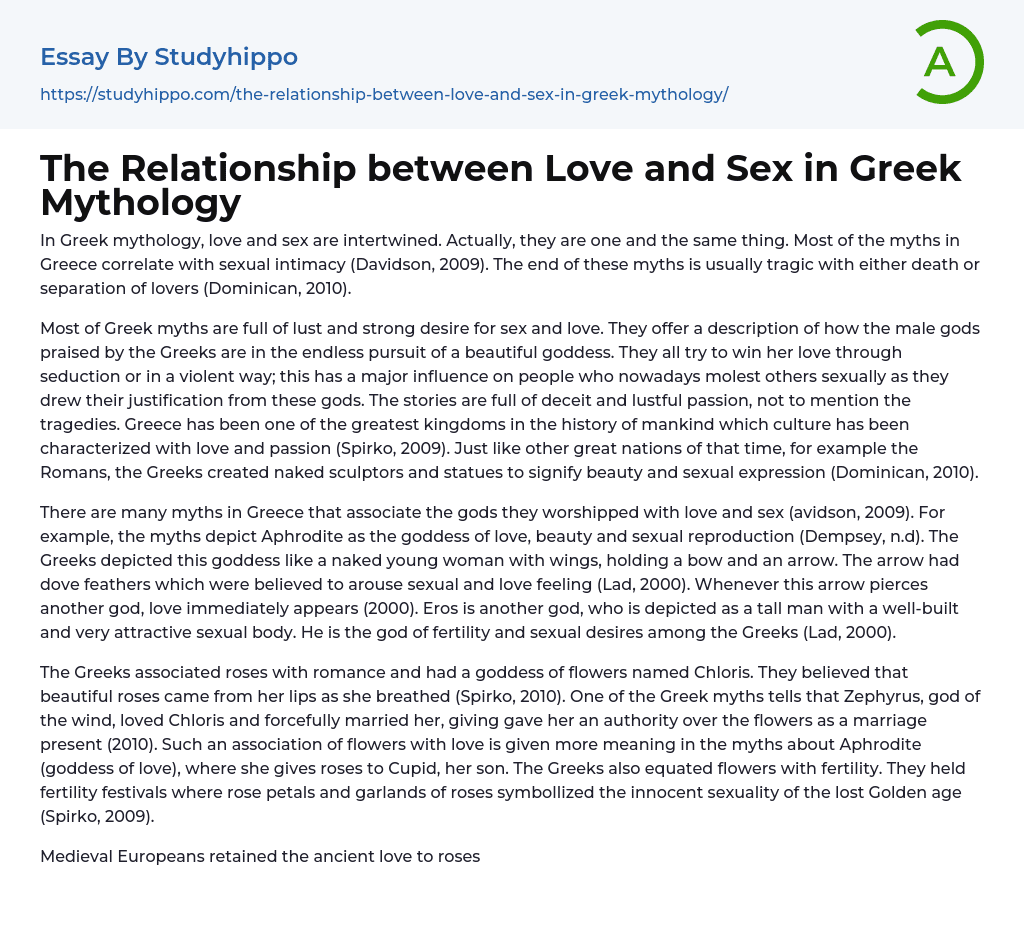

The Relationship between Love and Sex in Greek Mythology Essay Example
In Greek mythology, love and sex are intertwined. Actually, they are one and the same thing. Most of the myths in Greece correlate with sexual intimacy (Davidson, 2009). The end of these myths is usually tragic with either death or separation of lovers (Dominican, 2010).
Most of Greek myths are full of lust and strong desire for sex and love. They offer a description of how the male gods praised by the Greeks are in the endless pursuit of a beautiful goddess. They all try to win her love through seduction or in a violent way; this has a major influence on people who nowadays molest others sexually as they drew their justification from these gods. The stories are full of deceit and lustful passion, not to mention the tragedies. Greece has been one of the greatest kingdoms in the history of man
...kind which culture has been characterized with love and passion (Spirko, 2009). Just like other great nations of that time, for example the Romans, the Greeks created naked sculptors and statues to signify beauty and sexual expression (Dominican, 2010).
There are many myths in Greece that associate the gods they worshipped with love and sex (avidson, 2009). For example, the myths depict Aphrodite as the goddess of love, beauty and sexual reproduction (Dempsey, n.d). The Greeks depicted this goddess like a naked young woman with wings, holding a bow and an arrow. The arrow had dove feathers which were believed to arouse sexual and love feeling (Lad, 2000). Whenever this arrow pierces another god, love immediately appears (2000). Eros is another god, who is depicted as a tall man with a well-built and
very attractive sexual body. He is the god of fertility and sexual desires among the Greeks (Lad, 2000).
The Greeks associated roses with romance and had a goddess of flowers named Chloris. They believed that beautiful roses came from her lips as she breathed (Spirko, 2010). One of the Greek myths tells that Zephyrus, god of the wind, loved Chloris and forcefully married her, giving gave her an authority over the flowers as a marriage present (2010). Such an association of flowers with love is given more meaning in the myths about Aphrodite (goddess of love), where she gives roses to Cupid, her son. The Greeks also equated flowers with fertility. They held fertility festivals where rose petals and garlands of roses symbollized the innocent sexuality of the lost Golden age (Spirko, 2009).
Medieval Europeans retained the ancient love to roses by growing them in their gardens (Spirko, 2010). The flowers have come to be associated with love and a holiday which was celebrated on February 14th, the Valentine’s Day of love. The Victorian period witnessed a rise in popular literature works on specific virtues which symbolized flowers and love. It demonstrates a deep connection between love and sexuality. The best example is described in the myth about Eros and Psyche, which praises the importance of intimacy and trust (Dempsey, n.d.).
The Greek mythology shows a strong connection between love and sex with little regard on whether it was heterosexual or homosexual intimacy (Gilbert, 2010). There is a close relationship between love, sex and religion as is depicted in most of Greek myths. There are such symbols of love as flowers, and love poems of that period
are valuable in the contemporary world. The issues of sex as a form of intimacy between lovers which are depicted in the Greek myths are an inspiration for people to engage in truthful and safe relationships.
- Trojan War essays
- Apollo essays
- Iliad essays
- Achilles essays
- Odysseus essays
- Oedipus essays
- Hercules essays
- Myths essays
- Zeus essays
- Gilgamesh essays
- Creation Myth essays
- Creation Vs Evolution essays
- Appreciation essays
- American Literature essays
- Between The World and Me essays
- Book Report essays
- Book Review essays
- Book Summary essays
- Books essays
- Character essays
- Coming of Age essays
- Dante's Inferno essays
- Everyday Use essays
- Flowers for Algernon essays
- Genre essays
- Greek Mythology essays
- Incidents in The Life of a Slave Girl essays
- Letter essays
- Literary Criticism essays
- Literary devices essays
- Literature Review essays
- Metaphor essays
- Myth essays
- Play essays
- Plot essays
- Poem essays
- Poetry Analysis essays
- Protagonist essays
- Reader essays
- Reason essays
- Rhetoric essays
- Rhetorical Question essays
- Rhyme essays
- Simile essays
- Tragic Hero essays
- Translation essays
- Understanding essays
- Utopia essays
- Villain essays
- Writer essays



